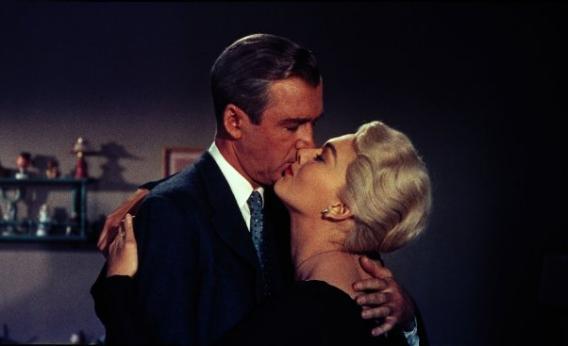Alfred Hitchcock’s Vertigo has overthrown Citizen Kane as the greatest film of all time, according to British magazine Sight & Sound. Citizen Kane had previously won the top spot in each decade since 1962. (Bicycle Thieves won the first Sight & Sound poll in 1952.) Vertigo’s rise to the top spot was not unheralded, however: It has risen in the poll’s estimation each decade since 1982, and came unusually close to unseating Citizen Kane in 2002.
The only two new entries to the top ten are Dziga Vertov’s experimental documentary Man with a Movie Camera (1929), making its first appearance at No. 8, and The Passion of Joan of Arc (1927), which also appeared in the 1952, 1972, and 1992 polls. Both films are silent, making for an unusual (but not unprecedented) three silent films on the list. (I, for one, blame Uggie.) The other silent film is Sunrise: A Song of Two Humans (1927), which appeared for the first time in 2002, and rises to No. 5.
Critics’ Top 10 Films of All Time
10. 8 ½
9. The Passion of Joan of Arc
8. Man with a Movie Camera
7. The Searchers
6. 2001: A Space Odyssey
5. Sunrise: A Song of Two Humans
4. La Règle du jeu
3. Tokyo Story
2. Citizen Kane
1. Vertigo
For the first time this year, Sight & Sound also revealed an extended list of its top 50 films of all time. On this list, The Godfather and The Godfather Part II dropped to Nos. 21 and 31, respectively. The two appeared together in the No. 4 spot last time, but this year Sight & Sound counted their votes separately. Notably, there are only a handful of comedies, and only one film was directed by a woman: Chantal Akerman’s Jeanne Dielman, 23 quai du Commerce, 1080 Bruxelles.
The most recent film to place in the top 50 was Mulholland Dr. (2002), coming in at No. 28, and the only other film from the 2000s was Wong Kar-wai’s In the Mood for Love (2000), which placed at No. 24. The most recent film to make the top ten was 2001: A Space Odyssey (1968), which premiered over 40 years ago. Mulholland Dr. was also chosen by Slate’s Dana Stevens last fall as the most enduring film since 2000.
As has been the tradition since 1992, Sight & Sound also asked a number of directors to nominate their picks for the greatest films. Their list contains several more recent films, including two movies from Francis Ford Coppola (The Godfather and Apocalypse Now) as well as one from Martin Scorsese (Taxi Driver). The top spot in the directors’ poll went to Tokyo Story (1953), a quiet family drama from Japanese master Yasujirō Ozu, while Vertigo only appeared at No. 7.
Directors’ Top 10 Films of All Time
1. Tokyo Story
t2. 2001: A Space Odyssey
t2. Citizen Kane
4. 8 ½
5. Taxi Driver
6. Apocalypse Now
t7. The Godfather
t7. Vertigo
9. Mirror
10. Bicycle Thieves
The Sight & Sound poll was compiled from the top-ten lists of 846 critics, programmers, academics and other movie-lovers, who together nominated more than 2,000 different films. Sight & Sound determines no criteria for “greatest,” suggesting only that “You might choose the ten films you feel are most important to film history, or the ten that represent the aesthetic pinnacles of achievement, or indeed the ten films that have had the biggest impact on your own view of cinema.” The poll is generally considered to be the most respected and the best barometer of changes to the canon over time. Roger Ebert wrote in 2002, “it is by far the most respected of the countless polls of great movies—the only one most serious movie people take seriously.”
When Citizen Kane took its fifth No. 1 spot in 2002, Dan Sallitt lamented in Slate how the canon and its representation in this poll had become “so stodgy.” While the changes to this year’s poll were generally incremental, those that agree with Sallitt can at least be happy that they got their new all-time champion.
